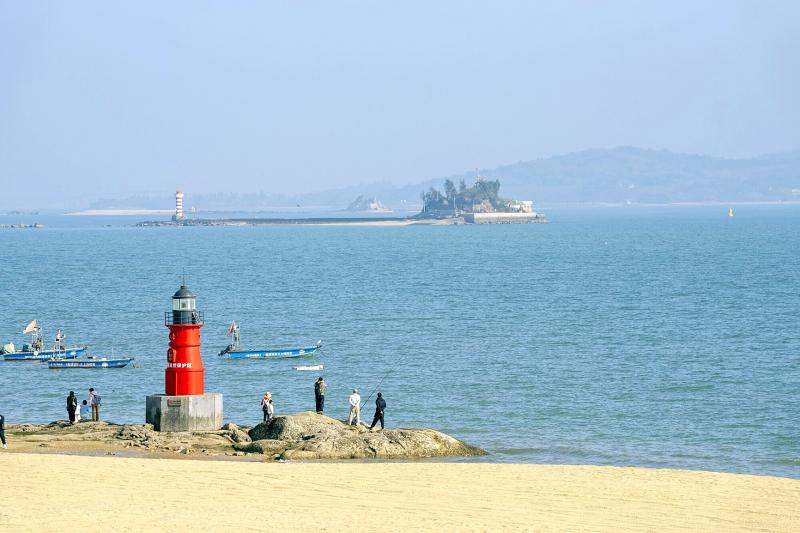China’s claim that the waters between Taiwan’s Kinmen County and China’s Xiamen are not a restricted area is an example of Beijing employing “gray zone” tactics to ratchet up pressure against Taipei, an expert said yesterday.
National Defense and Security Research research fellow Shen Ming-shih (沈明室) said the once-held tacit understanding between China and Taiwan that the waters around Kinmen, Lienchiang County (the Matsu islands) and other outlying islands are “restricted” or “prohibited” appears to be broken.
“Restricted” or “prohibited” waters refer to maritime areas controlled by Taiwan which, under Taiwanese law, it has the right to defend.

Photo: Bloomberg
The topic has become a point of contention after a speedboat from China’s Fujian Province on Wednesday capsized off the coast of Kinmen while being pursued by Taiwanese authorities, resulting in two fatalities.
China’s Taiwan Affairs Office on Saturday said “fishermen on both sides of the Taiwan Strait have been operating in traditional fishing areas around Xiamen-Kinmen since ancient times, and there is no such thing as prohibited or restricted waters.”
Shen said the announcement was equivalent to China’s previous declaration that there was no median line of the Taiwan Strait and was a way of doubling down on its claim that waters around Kinmen and Matsu are its territorial waters.
Beijing was also trying to dismiss the issue of Chinese boats illegally fishing in Taiwan’s waters, Shen said, adding that Beijing’s actions could be an attempt to legitimize future gray zone tactics or military action.
Separately, a Taiwanese official familiar with cross-strait affairs, speaking on condition of anonymity, said that China would likely increase the number of incursions into Taiwan’s waters.
China last month used political pressure to ensure that Indonesia hosted the Asian Men’s U20 Volleyball Championship instead of Taiwan, unilaterally adjusted the flight path of commercial route M503 and last week making an incursion into restricted waters near Kinmen County using a civilian speedboat, the official said.
“The redirected flight path is particularly worrisome, because flights on routes W122 and W123 from Fuzhou and Xiamen connect with M503, and will now fly along the median line of the Taiwan Strait,” the source said, adding that military aircraft could use civilian flights as cover, which would get them closer to Taiwan proper and reduce the time that Taiwan has to respond to an attack.
“China is changing the status quo in the Taiwan Strait and increasing Taiwan’s defense burden,” the official said. “Moving forward we are likely to see an increase in gray zone tactics such as the boarding of Taiwanese vessels in the Taiwan Strait by China’s coast guard, and more incursions near the outlying islands using civilian vessels.”

RESOLUTIONS DEBATE: Taiwan’s allies said that UN and WHA resolutions cited by China and other nations ‘do not determine Taiwan’s participation in WHO activities’ A proposal to invite Taiwan to this year’s World Health Assembly (WHA) was rejected on Monday, resulting in Taipei’s absence from the annual meeting for a ninth consecutive year, although partners spoke up for Taiwan’s participation at the first day of the meeting. The first agenda item after the opening was a “two-on-two debate” on a proposal to invite Taiwan to participate at the WHA as an observer. Similar to previous years, two countries made statements in favor of the proposal, while two others expressed their opposition. Philippine Secretary of Health Teodoro Herbosa, president of the 78th WHA, accepted the WHA General Committee’s

Palauan President Surangel Whipps Jr arrived in Taiwan last night to kick off his first visit to the country since beginning his second term earlier this year. After arriving at Taoyuan International Airport at around 6:30 pm, Whipps and his delegation were welcomed by Minister of Foreign Affairs Lin Chia-lung (林佳龍). Speaking to gathered media, the Palauan leader said he was excited and honored to be back in Taiwan on his first state visit to Taiwan since he was sworn in this January. Among those traveling with Whipps is Minister of State Gustav N. Aitaro, Public Infrastructure

Premier Cho Jung-tai (卓榮泰) on Friday laid out the Cabinet’s updated policy agenda and recapped the government’s achievements ahead of the one-year anniversary of President William Lai’s (賴清德) inauguration. Cho said the government had made progress across a range of areas, including rebuilding Hualien, cracking down on fraud, improving pedestrian safety and promoting economic growth. “I hope the public will not have the impression that the Cabinet only asked the legislature to reconsider a bunch of legal amendments,” Cho said, calling the moves “necessary” to protect constitutional governance and the public’s interest. The Cabinet would work toward achieving its “1+7” plan, he said. The

Nvidia founder and CEO Jensen Huang (黃仁勳) hosted a dinner in Taipei last night with key Taiwanese suppliers to celebrate the successful mass production of the company’s new Blackwell AI systems. Speaking to the media earlier yesterday, Huang thanked Nvidia’s Taiwanese partners for their contributions to the company’s ecosystem, while also sharing his plans to meet with Taiwan Semiconductor Manufacturing Co (TSMC) founder Morris Chang (張忠謀). In response to rumors that Nvidia will launch a downgraded Hopper H20 chip for China in July, Huang dismissed the reports, saying, “That is not true.” He clarified that there